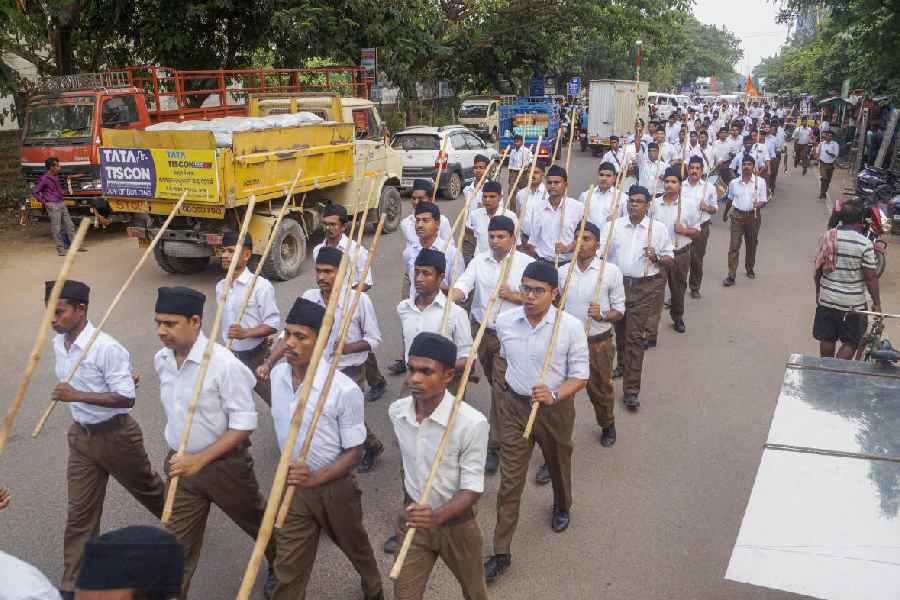The RSS has recently told Union home minister Amit Shah that during the drive to detect and deport Bangladeshi infiltrators, Bengali-speaking Indian citizens should not be harassed.
A source said a top functionary of the RSS had made that communication amid growing reports of atrocities on, and harassment and detention of Bengali-speaking people and their alleged deportation to Bangladesh in some cases.
This issue has allowed the Trinamool Congress to reap political dividends by invoking Bengali sentiments ahead of the Assembly elections next year.
“The Union government or the state governments with whom we have communicated have no intention of harassing people from Bengal. Yes, there is a problem during detection because of the common language and because the groundwork is executed by grassroots police personnel. In most cases, those who were harassed had failed to produce proper documents,” said a senior RSS leader.
It is the RSS’s stance that the country must be freed from infiltration and that all intruders should be sent back to their country of origin, as they have been “eating into opportunities” meant for Indian citizens.
The RSS’s concern is significant at a time when politics in Bengal has been gripped by the “Bengali phobia” issue, successfully launched by Mamata Banerjee. The Opposition parties, particularly the BJP, have taken a back seat in this connection. Trinamool feels it has an advantage on the issue.
The RSS leadership made its stance clear that it didn’t believe in any division among Indians in terms of language, caste or creed. The outfit plans to wipe out all such divisions and bring Indian society under one umbrella.
“The RSS has a deep connection with Bengal, and the examples are unending. Bengal even played a pivotal role in forming the RSS. Its founder, K.B. Hedgewar, known by the moniker ‘Doctorji’ in the Sangh, was a student of Calcutta Medical College. He himself spoke very good Bengali,” said a top RSS leader.
Hedgewar founded the RSS in Nagpur in 1925 and was deeply connected with Bengal.
The RSS, the ideological fountainhead of Hindutva, has expanded its footprint threefold in Bengal over the past decade, with 4,540 units (comprising all three categories) in the state.
A senior RSS leader in Bengal said the state has around 43,000 villages and RSS swayamsevaks had reached around 22,000 villages during the Ram Mandir inauguration.
“During the centenary celebrations, we plan to reach at least 35,000 Bengal villages,” he said. Besides this, on the occasion of Mahalaya, RSS swayamsevaks in uniform will take out a parade that will be followed by centenary celebrations kicking off from Bijaya Dashami this year.
The BJP believes that the RSS played a significant role in winning the Delhi Assembly elections earlier this year by organising micro-level meetings on the ground, and that its prominent presence will silently help the party in Bengal as well. A source said the RSS had conducted thousands of micro-level meetings in Delhi.
“As a social organisation, we believe that all voters should go out and exercise their franchise. In Delhi, we campaigned and requested people to vote. We made people aware of social issues but never asked them to cast their vote in favour of any political party,” said a senior
RSS leader.
“In the case of Bengal, we want such meetings to be organised in lakhs, if possible,” he added.
A source said such a massive drive to bring people out to vote would certainly help Bengal witness a change in power.
“If you see, the educated middle class in urban areas, particularly Hindus living in multi-storey housing complexes, come out to vote in very low numbers. If those people start voting, the results in Bengal will change,” he said.
However, in Bengal, Muslims constitute around 30 per cent of the population, and many believe that the RSS cannot reach out to this community effectively because of its hardline Hindutva stance.
Still, a senior RSS leader in Calcutta said many Muslims had been keeping in touch with the Sangh on local issues related to the state government’s failures, corruption, and law-and-order problems.










